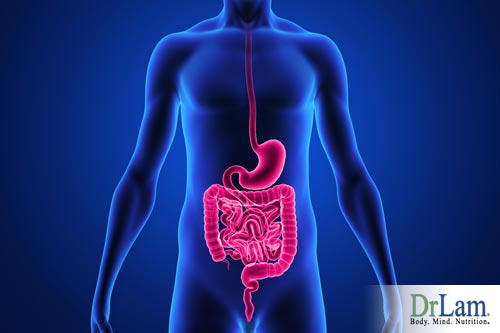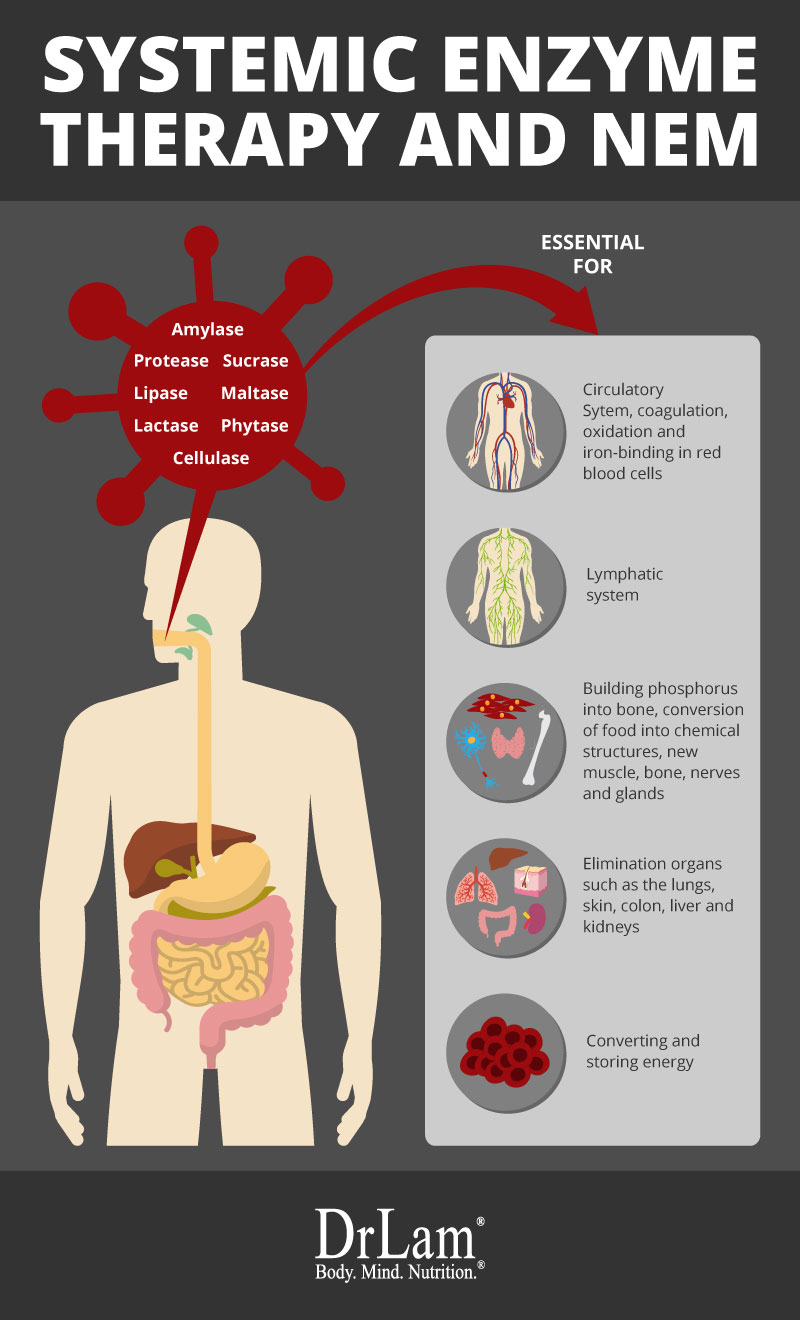 Enzymes are biologically active proteins that act as catalysts to help control and speed up chemical reactions in the body. Without them, these reactions would take too long and would require too much energy to be feasible. Systemic enzyme therapy can help.
Enzymes are biologically active proteins that act as catalysts to help control and speed up chemical reactions in the body. Without them, these reactions would take too long and would require too much energy to be feasible. Systemic enzyme therapy can help.
There are three main classes of enzymes: digestive, metabolic and food-based. Digestive enzymes help us digest our food. Metabolic enzymes help run our bodies’ functions. Food-based enzymes are those we get from (mainly raw) foods.
Oral enzymes can be used for digestion or in systemic enzyme therapy that acts on the entire body.
In this article, we will cover the benefits of both, but with a focus on how therapy with systemic enzymes can help with pain, inflammation and cancer. We will also take a look at how enzymes can help play a role in adrenal fatigue recovery.
Enzymes are naturally occurring substances found in all organisms. Without them, animal and plant life would not be possible. These miracle workers are not only essential for aiding with life-sustaining processes – they also play a part in the production of certain kinds of foods such as cheese and bread, and drinks such as beer and wine.
Enzymes are shaped in a way that allow for other molecules to fit inside the hollow areas within their folds. When they bind or hook with other substances, they actually create a new protein. Hundreds of thousands of new chemical combinations can be formed in order to serve every organ, tissue, and cell in your body.
Enzymes operate on both a chemical and biological level, and in that role they are supremely efficient and powerful – sometimes carrying out millions of reactions per second. Researchers are now starting to observe that enzymes also have a protein carrier that contain a vital energy factor.
This vital energy factor, or life force energy, is the energy needed to begin the chemical reaction the enzyme is responsible for. It is not part of the chemical formation of the enzyme, but a factor that the enzyme is carrying.
This is what makes the difference between an enzyme and a synthetic catalyst, which can only carry out chemical actions but does not carry energy factors.
As powerful and efficient as enzymes are, they are also fragile substances that cannot survive beyond certain temperatures or pH levels. Heat kills enzymes. If they are exposed to anything above 118 degrees Fahrenheit, they are no longer active. This is another reason it is important to incorporate raw foods into your diet.
The pancreas produces most of your digestive and metabolic enzymes.
Digestion begins as soon as you put a piece of food in your mouth. The action of chewing the food (called mastication) and releasing saliva begins the breakdown process. Amylase enzymes in the saliva work on carbohydrates in the mouth and finish their job in the small intestine.
Once swallowed, the food passes down to the stomach where protein is broken down by the protease enzyme. Afterwards, the food goes through to the small intestine where fats are digested by lipase and where the breakdown of carbohydrates is completed. Once the food has been converted into absorbable micronutrients, these micronutrients then pass through the small intestine’s walls and into the bloodstream.
 Digestion also releases the vitamins and minerals contained within the food so that they can be absorbed into the bloodstream.
Digestion also releases the vitamins and minerals contained within the food so that they can be absorbed into the bloodstream.
Amylase, protease and lipase are the main digestive enzymes utilized in systemic enzyme therapy, although there are few more that are also important:
The interesting thing about cellulase is that it isn’t actually produced by the body. It is usually part of a systemic enzyme therapy given to people who need help to break down cell walls in order to receive nutrients from vegetables.
So, for example, if you’ve done everything you can to heal your gut and you’re still not getting all the minerals you need, it might be because you’re not breaking down the cell walls properly and need that extra help from a cellulase supplement.
Metabolism is the umbrella term used to describe all the chemical processes that take place within the cells to keep you alive. This includes transforming food into energy and building blocks for the body, and also the elimination of waste left over from these metabolic processes.
Metabolism can be categorized into two distinctions: catabolism and anabolism. Catabolism is the breaking down of matter (which releases energy) and anabolism is the building up of matter (which consumes energy).
Systemic enzyme therapy catalyzes all of these reactions, but they don’t only speed things up, they are also essential for:
And much more…
Taking oral enzymes between meals, for systemic enzyme therapy use, helps your cells carry out these vital metabolic functions.

Adrenal fatigue occurs when the adrenal glands, part of the hypothalamic-pituitary-adrenal (HPA) hormonal axis, begin to dysregulate in their cortisol production. Cortisol is an anti-stress hormone that has many functions such as regulating blood pressure, reducing inflammation, suppressing the immune system and maintaining the heart and blood vessels.
When your body is exposed to stress, cortisol is secreted to neutralize it, and that is a natural and healthy response. However, when stress becomes chronic, your adrenal glands have to increase their cortisol production to meet this high demand. This rise in cortisol production is indicated in the first stages of Adrenal Fatigue Syndrome (AFS).
If the stress does not abate, the adrenal glands become exhausted and cortisol output drops significantly, leaving the body to deal with stress without its most potent defense mechanism.
 Some of the symptoms of AFS include tiredness, brain fog, difficulty losing weight, lowered immunity, difficulty falling asleep, waking up in the middle of the night, anxiety, mild depression, heart palpitations, low libido and food sensitivities.
Some of the symptoms of AFS include tiredness, brain fog, difficulty losing weight, lowered immunity, difficulty falling asleep, waking up in the middle of the night, anxiety, mild depression, heart palpitations, low libido and food sensitivities.
The adrenal glands are not the only organs that respond to stress in the body. The NeuroEndoMetabolic (NEM) stress response is a collection of organs and systems that work together to handle stress globally. It represents the entire body’s stress control apparatus.
The NEM is organized into six circuits, each dealing with stress in its own way. They include the metabolism response, the hormone response, the cardionomic response, the neuroaffective response, the inflammation response, and the detoxification response.
The NEM components can also become dysregulated from chronic stress, and at some point, they begin to weaken and wear out, bringing about other symptoms and health issues.
Many people with adrenal fatigue suffer from digestive difficulties, inflammation, and weight problems. This is why enzyme supplementation may be an avenue to consider.
Take inflammation, for example. It is a huge stressor on the body, as well as a symptom of stress. Inflammation can also trigger or compound the symptoms of adrenal fatigue, such as bloating, anxiety, depression and brain fog.
Enzymes are powerful anti-inflammatory agents, and we will see why in more detail below. However, they can also help mitigate other problems that can arise concomitantly with, or even because of, adrenal fatigue – such as gastrointestinal issues.
© Copyright 2017 Michael Lam, M.D. All Rights Reserved.

